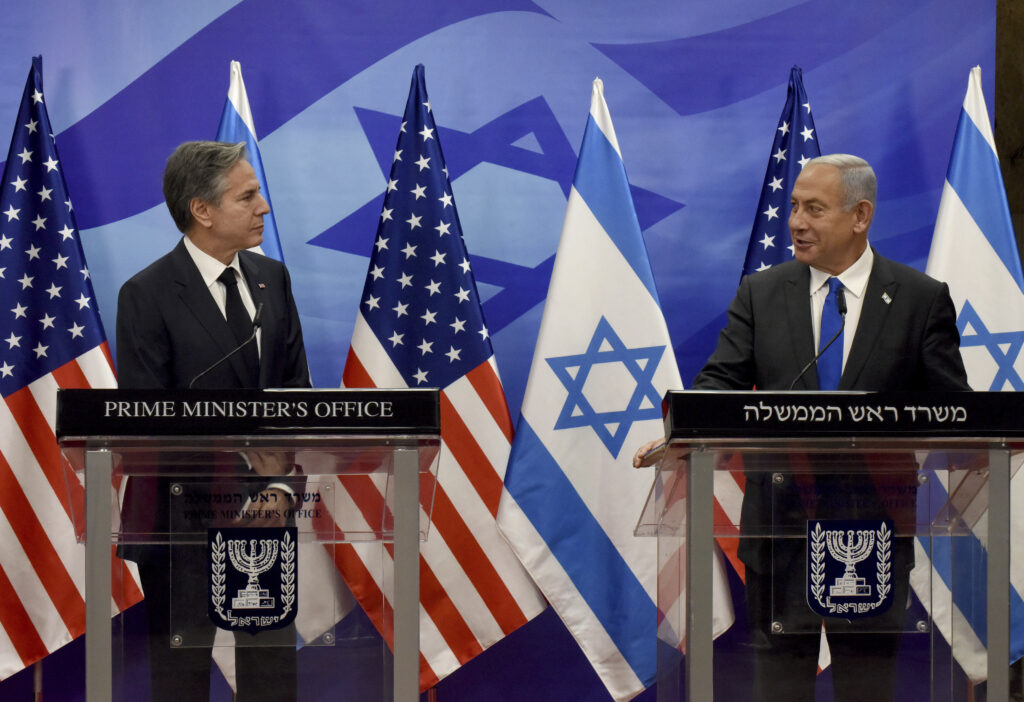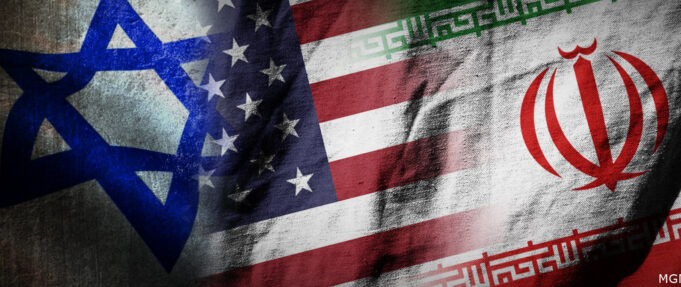With recent trips to the Middle East by bigwigs of American foreign policy, heightened violence in the Zionist State of Israel remained unabated and a United States-led, Israeli-instigated, and regional anti-Iran agenda moved closer to conflict with the Islamic Republic.
U.S. Secretary of State Antony Blinken traveled the region as January came to a close and met with Israeli Prime Minister Benjamin Netanyahu, his ultra-rightwing regime, and Palestinian Authority President Mahmoud Abbas. The trip yielded no breakthroughs in Israeli bloodletting, illegal land grabbing and repression of Palestinians, but a firmer contempt for their mutual foe Iran was strengthened.
Israel pressed America for stronger anti-Iran measures and advocated military action. Antagonism has brought the three nations to the precipice of war, which peace advocates caution would be catastrophic. The Honorable Minister Louis Farrakhan of the Nation of Islam has warned America against being baited into conflict with Iran by Israel. Echoing his teacher, the Most Honorable Elijah Muhammad, he forewarned both Zionists and America will lose greatly under such actions.
“And to those of you who are Jewish: Please remember that if you use your tremendous power and influence to guide America again into war, this will be the end of your power as a ‘Jewish people’ and ‘nation’ universally. And America will go down if she follows your errant, insane arrogance and guidance,” Minister Farrakhan warned in Part 17 of a yearlong lecture series called “The Time and What Must Be Done,” delivered in 2013.
America has waged economic warfare through sanctions and covert ops against Iran. Some analysts say America is working with Israeli intelligence for regime change.
“So you make the people suffer; and this is what you’re doing to Iran! This is what you’re doing to North Korea! This is what you do to any nation that does not bow to your will,” said Minister Farrakhan.
Ajamu Baraka, national organizer with the Black Alliance For Peace, an anti-imperialism group, sees the question of Iran as a divided issue among U.S. policymakers. “I think that there’s a definite lack of a consensus among U.S. policymakers of what to do with Iran,” Mr. Baraka said.
He cited President Joe Biden’s failure to reverse decisions of his predecessor Donald Trump, who took America out of a multination nuclear agreement with Iran. Mr. Biden continued the Trump-era U.S. sanction regime and placed more pressure on Tehran.
“It demonstrates that there are different factions of the ruling elite that believe … they need to intimidate Iran using Israel,” Mr. Baraka said.
The intimidation is primarily meant to pressure Iran on its support for resistance movements like Hezbollah in Lebanon, and the Ansar-Allah [Houthi] movement—fighting a U.S.-supported gulf state coalition war in Yemen.
“For Israel … they’ve been quite clear,” Mr. Baraka said. “They want to use nuclear weapon pretense to galvanize support for a preemptive strike on Iran.”
Iran maintains that their program is for peaceful purposes. Critics of Israel argue the proverbial “fly in the milk” is that Israel is the only nuclear power in the region and refuses to sign non-nuclear proliferation agreements.

“And that’s a double standard that always gets avoided,” said Netfa Freeman of Pan-African Community Action. “They are a nuclear state that has nuclear weapons. They feel very threatened by Iran.”
Mr. Freeman explained Israel advocates American intervention, which has had regime change designs in Iran since the 1979 Islamic Revolution overthrew an American-backed puppet regime.
“But they [America] are much more careful to avoid a nuclear confrontation or escalate things in a nuclear way,” he said.
On weapons of mass destruction threats, Middle East watchers note Iran is not the real aggressor in this drama, considering the record of America and Israel. America holds the distinction of being the only power that has ever used such weapons, in World War II in Japan. Israel has a track record of attacking nuclear facilities of other nations and assassinating Iranian nuclear scientists. As recent as December 2022, suspicion fell on Israel in the wake of multiple drone attacks on Iranian military installations, which Tel Aviv neither confirmed nor denied responsibility for.
Secretary of State Blinken visited the region Jan. 30-31. During a Jan. 31 interview with CNN, Benjamin Netanyahu admitted Israel’s involvement in acts of sabotage and terrorism in Iran. He stated that Israel has been “taking action against certain weapons development” and added: “I never talk about specific operations … and every time some explosion takes place in the Middle East, Israel is blamed or given responsibility—sometimes we are, sometimes we’re not.”
The attack happened Jan. 28 in the Iranian city of Isfahan, two days before Mr. Blinken’s visit to Israel and two days after U.S. Central Intelligence Agency director William Burns left Israel. Iranian officials said early investigations suggested the Israeli regime was responsible for the aggressive act.
Isfahan is the site of a workshop complex of the Iranian Defense Ministry. The facility that was struck is in the middle of the city and did not appear to be nuclear-related, according to Iranian officials.
In response, a Feb. 1 letter from Iran’s UN ambassador called on the UN Security Council to take Israel to task for its malicious activities in the region and threats on Iran’s critical infrastructure and peaceful nuclear facilities.
“The United Nations Security Council must fulfill its responsibility under the Charter and condemn Israel’s warmongering statements and acts of terrorism … which pose a serious threat to regional and international peace and security,” said Ambassador Amir Saeid Iravani.
Mr. Iravani said Iran reserves its legitimate and inherent right by international law to defend its national security and respond resolutely to any threats or wrongful actions by Israel, wherever and whenever necessary. Divide and conquer has been the name of the game as the U.S. and Israel construct a pro-war coalition in the region against Tehran, chiefly trying to gain the signature of the Royal Kingdom of Saudi Arabia, the main regional rival of Iran among gulf states.
However, in interviews, analysts told The Final Call, the kingdom, as other Arab nations, has held relations with Israel. Riyadh supported the diplomatic process of the so-called “Abraham Accords” signed in September 2020, “normalizing” ties between the United Arab Emirates and Bahrain with Israel, followed by others.
Both maintained longstanding and all but covert dealings in trade, security, and diplomatic relations for years, Phyllis Bennis of the Institute for Policy Studies told The Final Call in a 2021 interview. “This was making public, what has long been the reality on the ground,” she said. Mr. Blinken stated Washington intends to expand the accords. After generations of non-recognition, on Feb. 2, the transitional government in Sudan finalized its deal to normalize relations in Khartoum, reported Reuters.
In a Feb. 3 statement, the Palestinian Hamas resistance movement denounced Sudan’s decision saying it contradicts a general Sudanese stance against normalization ties with the occupying state.
“We reiterate our rejection of all forms of normalization with the occupying Israeli regime, and call on Sudanese authorities to reverse the decision, which runs contrary to the interests of the brotherly Sudanese nation and would only serve Israel’s agenda,” the statement read. America’s unconditional support for the Zionist state, and gangster-like global posture is producing insecurity.
In the prolific book “Closing The Gap” by Brother Jabril Muhammad, Minister Farrakhan said because of the insecurity America invokes in smaller nations, out of fear of their own survival they will work furiously to gain weapons of mass destruction believing that is the only deterrent to what America’s preemptive aggressive strike would stay. “They must have the ability to respond in like fashion. Then and only then do they feel that a dialogue that has meaning can take place,” Minister Farrakhan said.
“To make Syria afraid; to make Iran afraid; to make North Korea afraid; to make any little small nation afraid is to say to them as the scripture says, ‘Wake up the mighty men of war. And let them turn their plow shares and their pruning hooks into spears and swords’ because this is a time of global war,” reasoned the Minister. “Their efforts for peace may be noble, but they will not come to pass until war has decimated the war-mongers. And many, many, many, many millions of human lives will be lost. But at the end of it all, God will establish His kingdom on earth.”—Brian E. Muhammad, Staff Writer













